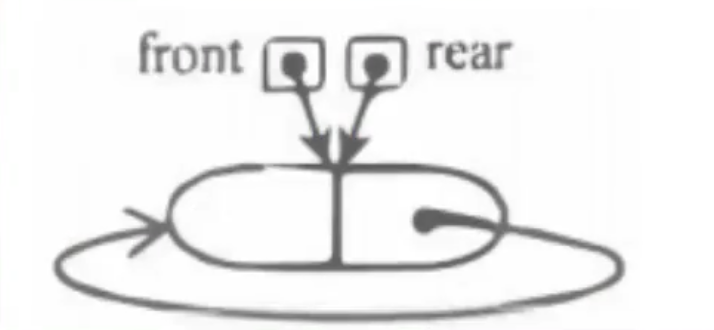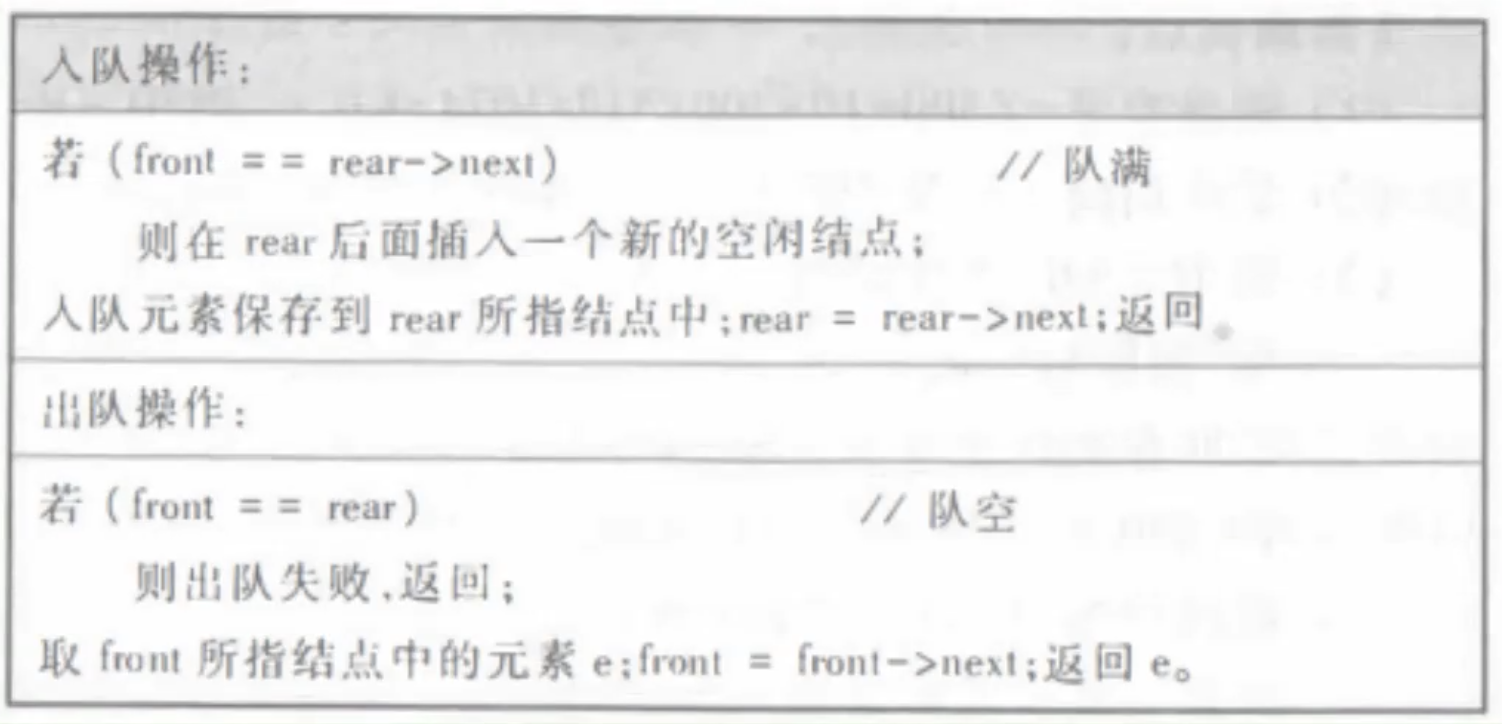本章需要掌握:
- 1、顺序栈(初始化、栈空?入栈、出栈、栈顶元素)
- 2、顺序队列(初始化、队列空?入队、出队)
- 3、链队列
- 4、2019真题循环队列
1、顺序栈(初始化、栈空?入栈、出栈、栈顶元素)
1
2
3
4
5
6
7
8
9
10
11
12
13
14
15
16
17
18
19
20
21
22
23
24
25
26
27
28
29
30
31
32
33
34
35
36
37
38
39
40
41
42
43
44
45
46
47
48
49
50
51
52
53
54
55
56
57
58
59
60
61
62
63
64
65
66
67
68
69
70
71
72
73
74
75
76
77
78
79
| #include <stdio.h>
#include <stdlib.h>
#define MaxSize 50
typedef int ElemType;
typedef struct{
ElemType data[MaxSize];
int top;
}SqStack;
void InitStack(SqStack &S)
{
S.top=-1;
}
bool StackEmpty(SqStack S)
{
if(-1==S.top)
{
return true;
}else{
return false;
}
}
bool Push(SqStack &S,ElemType x)
{
if(S.top==MaxSize-1)
{
return false;
}
S.data[++S.top]=x;
return true;
}
bool GetTop(SqStack S,ElemType &m)
{
if(StackEmpty(S))
{
return false;
}
m=S.data[S.top];
return true;
}
bool Pop(SqStack &S,ElemType &m)
{
if(StackEmpty(S))
{
return false;
}
m=S.data[S.top--];
return true;
}
int main() {
SqStack S;
InitStack(S);
bool flag;
flag=StackEmpty(S);
if(flag)
{
printf("stack is empty\n");
}
Push(S,3);
Push(S,4);
Push(S,5);
ElemType m;
flag=GetTop(S,m);
if(flag)
{
printf("get top %d\n",m);
}
flag=Pop(S,m);
if(flag)
{
printf("pop element %d\n",m);
}
return 0;
}
|
2、顺序队列(初始化、队列空?入队、出队)
1
2
3
4
5
6
7
8
9
10
11
12
13
14
15
16
17
18
19
20
21
22
23
24
25
26
27
28
29
30
31
32
33
34
35
36
37
38
39
40
41
42
43
44
45
46
47
48
49
50
51
52
53
54
55
56
57
58
59
60
61
62
63
64
65
66
67
68
69
70
71
72
73
74
75
76
77
78
79
80
81
| #include <stdio.h>
#include <stdlib.h>
#define MaxSize 5
typedef int ElemType;
typedef struct{
ElemType data[MaxSize];
int front,rear;
}SqQueue;
void InitQueue(SqQueue &Q)
{
Q.front=Q.rear=0;
}
bool isEmpty(SqQueue Q)
{
return Q.rear==Q.front;
}
bool EnQueue(SqQueue &Q,ElemType x)
{
if((Q.rear+1)%MaxSize==Q.front)
{
return false;
}
Q.data[Q.rear]=x;
Q.rear=(Q.rear+1)%MaxSize;
return true;
}
bool DeQueue(SqQueue &Q,ElemType &x)
{
if(Q.rear==Q.front)
{
return false;
}
x=Q.data[Q.front];
Q.front=(Q.front+1)%MaxSize;
return true;
}
int main() {
SqQueue Q;
InitQueue(Q);
bool ret;
ret=isEmpty(Q);
if(ret)
{
printf("SqQueue is Empty\n");
}else{
printf("SqQueue is not Empty\n");
}
EnQueue(Q,3);
EnQueue(Q,4);
EnQueue(Q,5);
ret=EnQueue(Q,6);
ret=EnQueue(Q,7);
if(ret)
{
printf("EnQueue success\n");
}else{
printf("EnQueue failed\n");
}
ElemType element;
ret=DeQueue(Q,element);
if(ret)
{
printf("DeQueue success\n");
}else{
printf("DeQueue failed\n");
}
ret=EnQueue(Q,8);
if(ret)
{
printf("EnQueue success\n");
}else{
printf("EnQueue failed\n");
}
return 0;
}
|
3、链队列
1
2
3
4
5
6
7
8
9
10
11
12
13
14
15
16
17
18
19
20
21
22
23
24
25
26
27
28
29
30
31
32
33
34
35
36
37
38
39
40
41
42
43
44
45
46
47
48
49
50
51
52
53
54
55
56
57
58
59
60
61
62
63
64
65
66
67
68
69
70
71
72
73
| #include <stdio.h>
#include <stdlib.h>
typedef int ElemType;
typedef struct LinkNode{
ElemType data;
struct LinkNode *next;
}LinkNode;
typedef struct{
LinkNode *front,*rear;
}LinkQueue;
void InitQueue(LinkQueue &Q)
{
Q.front=Q.rear=(LinkNode*)malloc(sizeof(LinkNode));
Q.front->next=NULL;
}
void EnQueue(LinkQueue &Q,ElemType x)
{
LinkNode *pnew=(LinkNode*)malloc(sizeof(LinkNode));
pnew->data=x;
pnew->next=NULL;
Q.rear->next=pnew;
Q.rear=pnew;
}
bool DeQueue(LinkQueue &Q,ElemType &x)
{
if(Q.rear==Q.front)
{
return false;
}
LinkNode* q=Q.front->next;
x=q->data;
Q.front->next=q->next;
if(Q.rear==q)
{
Q.rear=Q.front;
}
free(q);
return true;
}
int main() {
LinkQueue Q;
InitQueue(Q);
EnQueue(Q,3);
EnQueue(Q,4);
EnQueue(Q,5);
EnQueue(Q,6);
EnQueue(Q,7);
ElemType element;
bool ret;
ret=DeQueue(Q,element);
if(ret)
{
printf("DeQueue success element= %d\n",element);
}else{
printf("DeQueue failed\n");
}
DeQueue(Q,element);
ret=DeQueue(Q,element);
if(ret)
{
printf("DeQueue success element= %d\n",element);
}else{
printf("DeQueue failed\n");
}
return 0;
}
|
4、考研真题2019——循环队列
42.(10分)请设计一个队列,要求满足:①初始时队列为空;②入队时:允许增加队列占用空间;③出队后,出队元素所占用的空间可重复使用,即整个队列所占用的空间只增不減;④入队操作和出队操作的时间复杂度始终保持为 O(1)。请回答下列问题:
(1) 该队列是应选择链式存储结构,还是应选择顺序存储结构?
(2) 画出队列的初始状态,并给出判断队空和队满的条件。
(3)画出第一个元素入队后的队列状态。
(4)给出入队操作和出队操作的基本过程。
4.1 答案
1、链式存储结构
2、

队空的判定条件∶front == rear。
队满的判定条件∶ front == rear->next。
3、插入第一个元素后的状态如下图所示。

4、操作的基本过程如下∶
(有个小问题就是入队的时候rear后插入一个新空闲节点,空闲节点指向front?可能代码有自纠错一类的)

4.2 王道代码
1
2
3
4
5
6
7
8
9
10
11
12
13
14
15
16
17
18
19
20
21
22
23
24
25
26
27
28
29
30
31
32
33
34
35
36
37
38
39
40
41
42
43
44
45
46
47
48
49
50
51
52
53
54
55
56
57
58
59
60
61
62
| #include <stdio.h>
#include <stdlib.h>
typedef int ElemType;
typedef struct LNode {
ElemType data;
struct LNode* next;
}LNode, * LinkList;
void EnQueue(LinkList front, LinkList& rear, ElemType val)
{
LinkList pnew;
if (rear->next == front)
{
pnew= (LinkList)malloc(sizeof(LNode));
rear->data = val;
rear->next = pnew;
pnew->next = front;
rear = pnew;
}
else {
rear->data = val;
rear = rear->next;
}
}
void DeQueue(LinkList& front, LinkList rear)
{
if (front == rear)
{
printf("queue is empty\n");
}
else {
printf("dequeue %d\n", front->data);
front = front->next;
}
}
void CircleQueue(LinkList& front, LinkList& rear)
{
front = (LinkList)malloc(sizeof(LNode));
rear = front;
rear->next = front;
EnQueue(front, rear, 3);
EnQueue(front, rear, 4);
DeQueue(front, rear);
DeQueue(front, rear);
DeQueue(front, rear);
}
int main()
{
LinkList front, rear;
CircleQueue(front, rear);
return 0;
}
|

































